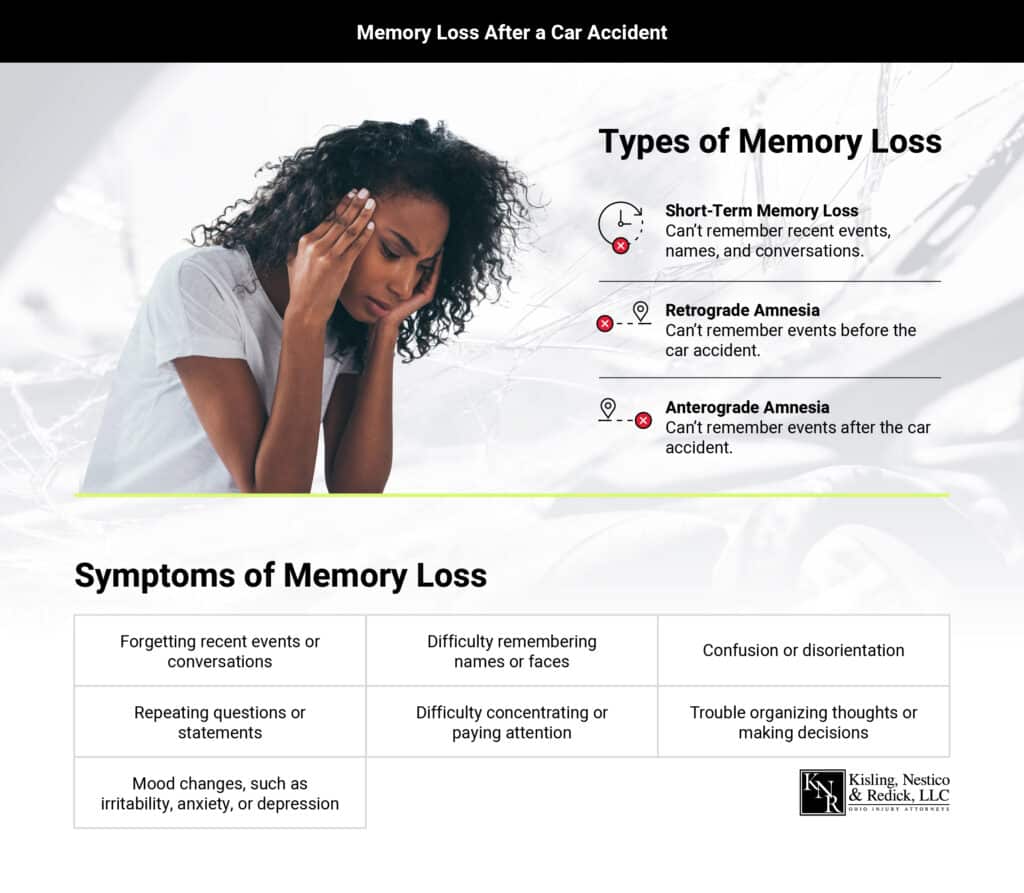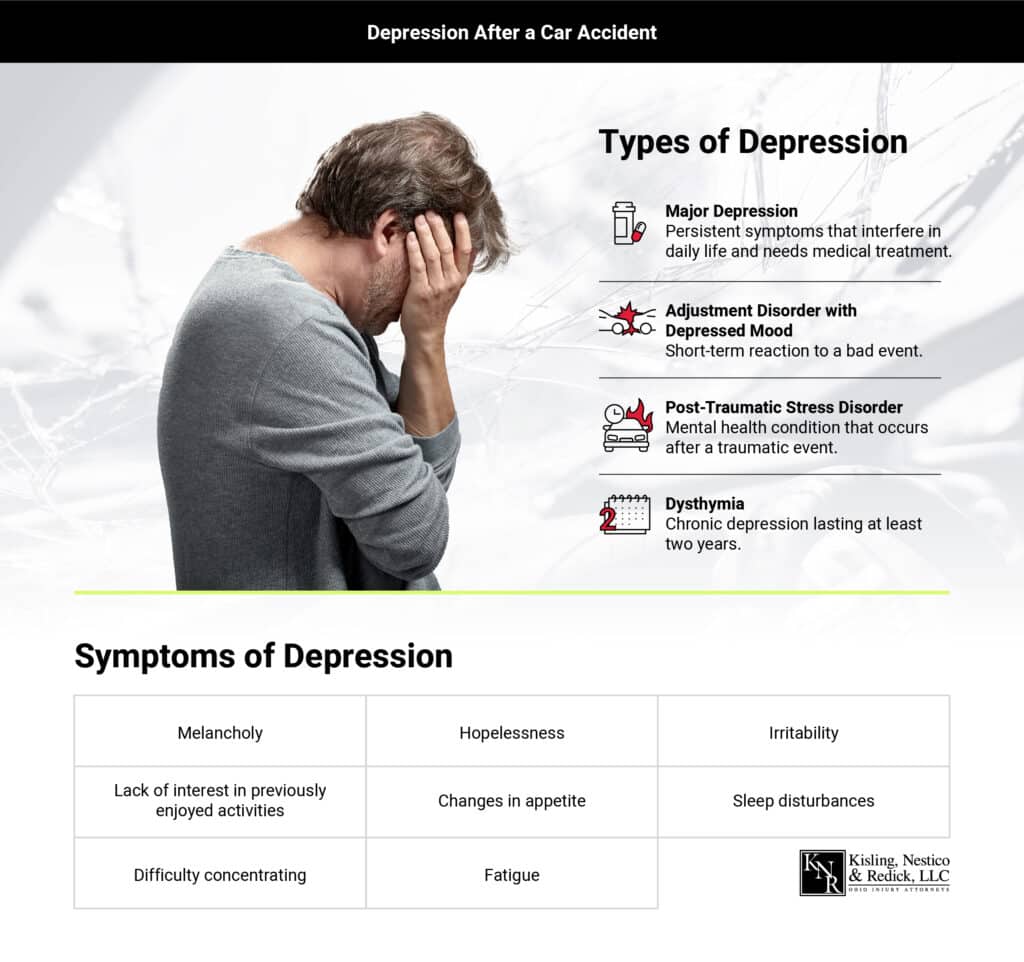Who’s At Fault in a Car Accident? A Guide to Liability in Ohio
Posted in: Car Accidents
Mental injuries after a car crash can be just as significant. Memory loss and depression are just two examples of psychological injuries that can impact a victim’s life as severely as physical pain, affecting their ability to function, work, and enjoy life.
As two common symptoms of traumatic brain injury, it is crucial to seek proper medical and legal assistance if you or a loved one experience depression and memory loss following a car wreck.
To discuss your situation with an experienced Ohio car accident lawyer, call KNR at 1-800-HURT-NOW for a free consultation.
Car accident victims often forget what happened before, during, or after a crash. And while memories can come back eventually, memory loss could also be a sign of a more severe brain injury. Usually, following a concussion, the sooner you identify and deal with memory loss after a car crash, the better.

Memory loss after a car accident can manifest differently, and the severity can vary from person to person. Here are the common types of memory loss that may occur after a car accident:
PTA is when a person experiences memory loss for events immediately before or after the injury. During PTA, a person may be disoriented, confused, and have difficulty forming new memories. The severity of PTA can vary, and the duration of PTA can range from a few minutes to several months, depending on the severity of the TBI.
It can be hard to admit you’re having trouble remembering things after a car wreck. But limited cognitive function can significantly impact a person’s daily life and ability to perform tasks. Here are the common symptoms of memory loss after a collision, and they should not be ignored:
Prompt medical attention after a car accident can help diagnose and treat any underlying injuries or conditions that may be causing memory loss. Seeking help early on can also improve the chances of a successful recovery and prevent further complications.
While everyone’s situation is different, treatment for memory loss after a car accident can include cognitive rehabilitation, which involves exercises and strategies to improve memory and cognitive function. This includes memory games, organization techniques, and exercises to improve attention and concentration.
Other treatments can include medication and therapy to address underlying mental health conditions such as depression or anxiety.
Car crashes are traumatic events that can trigger feelings of sadness, stress, and general unease. The prevalence of depression after a collision can vary depending on the severity and other factors, but studies show that up to 33% of people who have suffered a traumatic brain injury may experience symptoms of depression.
The symptoms of depression can include melancholy, hopelessness, irritability, and a lack of interest or pleasure in once-enjoyable activities. Other symptoms can include changes in appetite, sleep disturbances, difficulty concentrating, and fatigue.
These symptoms can negatively impact the victim’s life, affecting their ability to work, socialize, and carry out daily activities.

Here are some signs and different types of depression that may occur after a car accident:
Treatment for depression after a car accident can include medication, therapy, or a combination of both. Antidepressants and other medications can be effective in reducing the symptoms of depression.
At the same time, therapy can help the victim develop coping strategies and address any underlying issues contributing to depression.
Cognitive-behavioral therapy (CBT) is a common approach that focuses on identifying and changing negative thought patterns and behaviors. Other types of therapy, such as interpersonal or psychodynamic therapy, may also be used depending on the individual’s needs.
Lifestyle changes can also help alleviate symptoms of depression. This can include regular exercise, eating a healthy diet, and getting enough sleep. Activities such as yoga, meditation, or mindfulness practices may also help manage depression symptoms.
Untreated depression can decrease quality of life and increase the risk of developing other mental health conditions or substance abuse issues. Therefore, it is vital to work with a healthcare provider to determine the most appropriate treatment plan for depression after a car accident.
Treatment may need to be adjusted over time, and it is essential to have ongoing support and monitoring. Seeking proper medical care and treatment can help the victim recover and improve their well-being.
A brain injury may limit your ability to work, socialize, and live a normal life. In some cases, depression and memory loss are temporary and can improve over time, while in others, they can be long-lasting and indicative of a more serious traumatic brain injury.
Someone suffering from depression or memory loss after a car crash may be unable to earn a living as they did before or require ongoing medical care and therapy. If another’s negligence caused the accident, you might be entitled to compensation for your losses. This can include reimbursement for medical expenses, lost wages, and pain and suffering.
If you or a loved one are experiencing memory loss or depression after a car accident, it’s wise to consult a personal injury lawyer about the compensation you deserve and how to best protect your legal rights. By pursuing an insurance claim or lawsuit for the losses related to your depression or memory loss, you can recover the costs of your medical treatment, rehab, and other expenses related to your injury and have a sense of closure and justice.
You may be entitled to compensation for the various losses related to your memory loss or depression. At KNR, our attorneys have helped numerous people recover what they need to move on from the physical and mental harm caused by serious car accidents. Let us evaluate the details, help facilitate the care you need, and what you can expect from a claim or lawsuit.
Our offices are conveniently located throughout Ohio. As one of the largest personal injury firms in the state, we have fought for injured Ohioans for over 15 years and know how to get results.
Call 1-800-HURT-NOW for a free consultation, and there are no fees unless you recover compensation.
View all Car Accidents resources